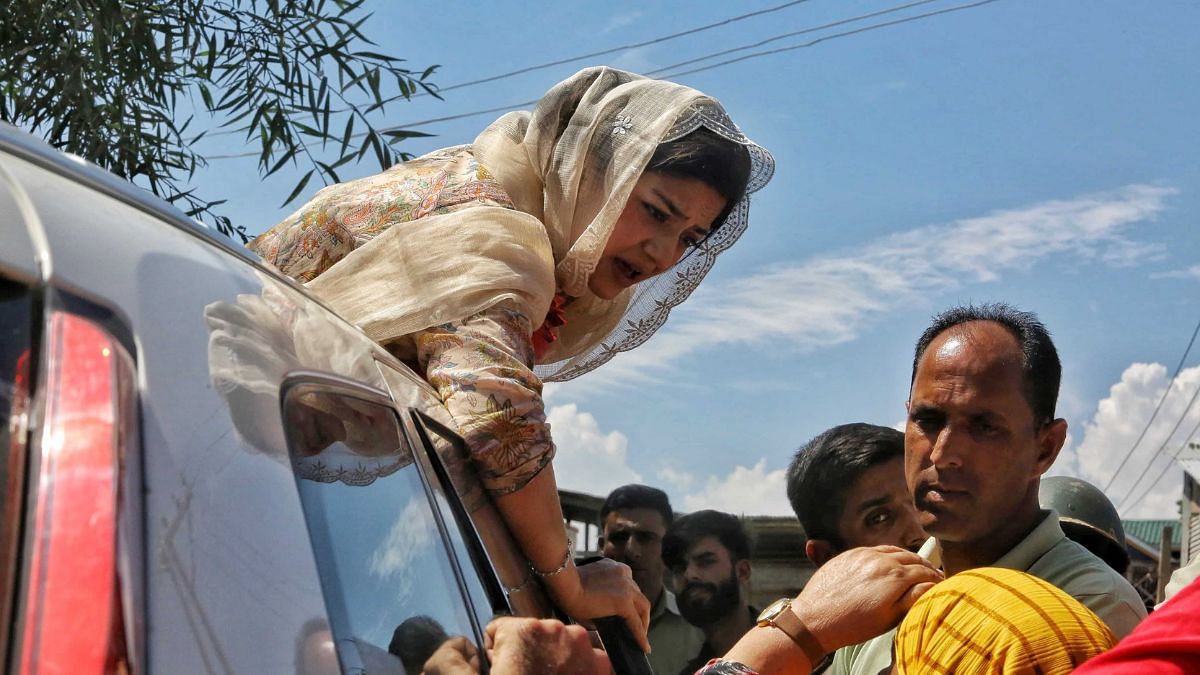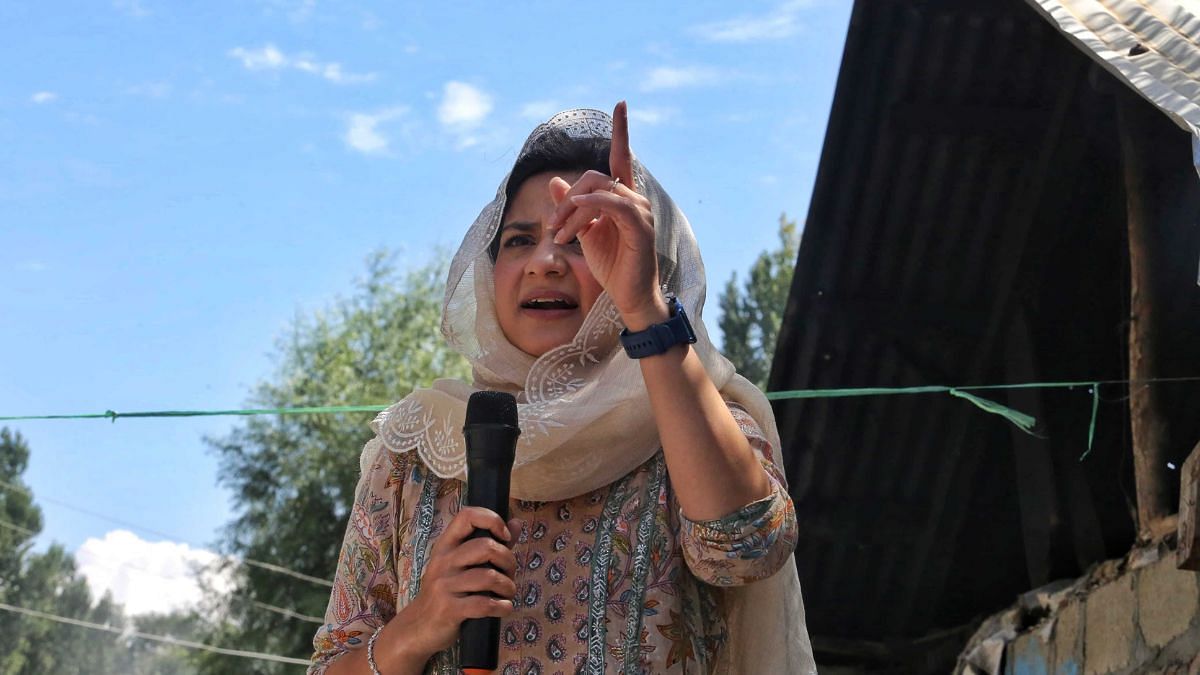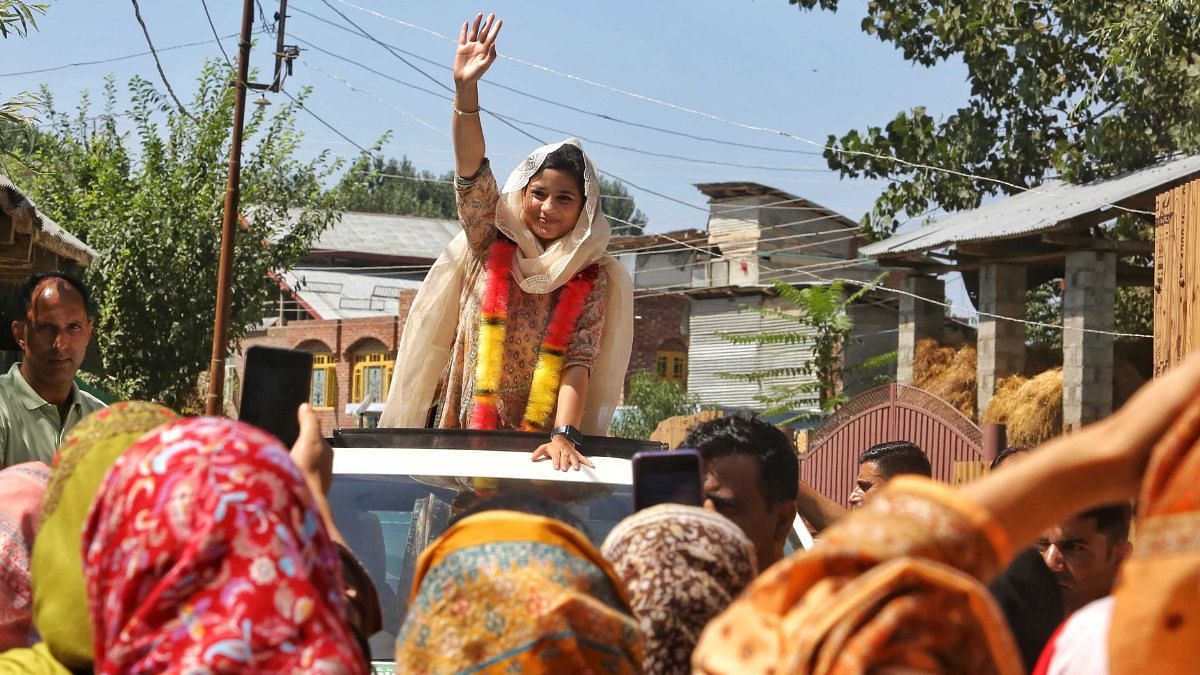Though the constituency is considered a bastion of the People’s Democratic Party (PDP)—the party has never lost an assembly election there since 1996—the NC has also been gaining ground steadily.
But Iltija isn’t deterred. “Aaapki MLA inshallah aapke saamne khadi hai (Inshallah your MLA is standing in front of you),” she told the women of Anantnag.
ThePrint caught up with Iltija for a freewheeling interview on her political debut and her vision for Jammu & Kashmir as it gears up for its first election in a decade.
Jammu & Kashmir will vote for a 90-member assembly in three phases starting 18 September and results will be announced on 4 October. It is also its first election since Article 370 was abrogated and the region’s “special status” was revoked five years ago.
With no single party likely to win on its own, Iltija believes Jammu & Kashmir will deliver a fractured verdict and the PDP will play the crucial role of “kingmaker” after the election with the future chief minister being just like a “mayor of a municipality”.
“You can see that there is no way for any particular party. There is going to be a completely fractured mandate. And it will be, eventually a coalition that will be cobbled up among various parties and the PDP in that is going to play a crucial role,” she told ThePrint on the campaign trail in Anantnag.
“There’s not going to be much of a difference between an MLA and the chief minister. This is a reality, but our weight, what we say, will count. So I’m not in the chief minister kaun banega race but one thing is for sure, the next government will not be formed without the support of the PDP. I feel like the PDP will be a kingmaker.”
The PDP was founded as a mainstream political party in 1999 and over the years rose to become a significant player in Kashmir, but its fortunes have dwindled in recent years.
Though the PDP is a part of the INDIA bloc, it is contesting the assembly election on its own. The Congress party is contesting the polls in alliance with the National Conference.
Also read: Ram Madhav’s appointment ‘political pragmatism’ for BJP before J&K polls, marks RSS’s return to helm
Working to revive the PDP
Iltija said she isn’t contesting to take the “mantle forward” but is making efforts to revive the party.
“It’s not about taking the mantle forward at all. If you see, our party stands at its weakest, at its lowest point… The media is projecting it like I’m being anointed and there’s some crown that’s being put on my head. It’s not,” she told ThePrint.
“We are working to revive the PDP. I think it’s all about giving people hope, giving them hope that we’ll give them a sense of safety, security and, most importantly, a sense of dignity.”
Iltija said it was the party’s decision to field her from Bijbehara.

“They felt that I emerged as a very strong voice post the abrogation of Article 370. They understand that we have a weak assembly which needs strong voices,” she said.
Both Iltija’s mother and grandfather, Mufti Mohammad Sayeed, made their electoral debut from the Bijbehara seat. Sayeed won from this south Kashmir seat in 1962 while Mehbooba Mufti won the seat in 1996.
Vision for Kashmir
Iltija’s entry into politics isn’t sudden. She was appointed media adviser to her mother and PDP president Mehbooba Mufti last year.
And she has been in charge of her mother’s social media handles since 2019 when many local leaders, including Mehbooba, were under arrest.
Iltija may be new to politics but she has a vision for the strife-torn Himalayan region.
One of her priorities is to help women whose husbands and sons have been languishing in jail for years.
She said that many women in the constituency have been raising issues about their sons and husbands being picked up by the police under “draconian” laws like the Unlawful Activities Prevention Act (UAPA) and Public Safety Act (PSA).
Many Kashmiris say the state misuses the anti-terror laws as tools of coercion in the name of maintaining law and order.
“As an MLA, you are a very tiny cog in the entire system, but my immediate priority would be to alleviate their miseries, alleviate their problems, and give them a sense of safety, give them a sense of dignity,” Iltija said.
“So many women complain about how their husbands, their sons, have been picked up by the police. They’re languishing in jails on trivial charges under draconian laws like UAPA, PSA,” she added.
“People here don’t even have safety. They don’t know if their sons are going to be picked up by the police on these trivial charges. So for me, the priority is to give them this assurance that their identity, their land, their resources, is not something that’s going to be under threat, and we will fight for their resources.”

Asked about the release of Baramulla MP and Awami Ittehad Party (AIP) chief Sheikh Abdul Rashid—popularly known as Engineer Rashid—to campaign for the assembly election, Iltija said the timing was “strange” but everyone had the right to contest and campaign.
Rashid—who won the Baramulla seat in the Lok Sabha from jail by defeating former chief minister Omar Abdullah in his own bastion—was jailed in 2019 following his arrest by the National Investigation Agency (NIA) under the UAPA in a 2017 terror funding case.
The AIP is offering a fresh alternative to voters and is expected to queer the pitch for mainstream parties such as the National Conference and the PDP.
Following his stunning win in the Lok Sabha election, Rashid has taken on PDP chief Mehbooba Mufti and her late father for having allied with the Bharatiya Janata Party (BJP) in the past, and even accused the PDP of bringing the BJP to Jammu & Kashmir.
“I find it extremely strange that a man who has been in jail for the past five years has been given bail at a time when you have elections. And he’s given interim bail just for two weeks. So I find that very strange, but it’s a welcome move,” she said.
Iltija said she didn’t think Rashid’s release would have an impact on the PDP in the assembly elections.
“Eeverybody in Kashmir has their own space. So, I don’t think we are insecure at all. I always say that a Kashmiri mind is very hard to read. They’re very opaque. They might come to attend your rallies, but who they vote for when they go into that booth is always a mystery. So we don’t know”.
Iltija hopes Rashid will be freed in the future.
“I hope that he’s not just given interim bail. I hope he is freed because, after all, he’s also the Member of Parliament for North Kashmir. So why should we deny the people of North Kashmir their elected representative? I’m sure they also have problems, and he needs to fulfill his duties as MP of North Kashmir,” she argued.
On what worked for Rashid in Baramulla, the PDP leader said, “The sentiment he espoused was the Azadi sentiment, which he still advocates for. So that tells you everything you need to know. I don’t need to state the obvious. If people overwhelmingly voted for him, and in that process, he trounced the former chief minister by over a margin of 3 lakh, it tells you exactly what the sentiment in Kashmir is.”
However, on the topic of alliance with the National Conference not working out, Iltija maintained that she was “wrong person to ask”.
“You don’t win because you’re part of an alliance or a coalition. At the end of the day, an MLA election is an individual fight. If people relate to Iltija Mufti, then they’ll vote for me. So the coalition part of it doesn’t scare me at all. But I think it’s good if other parties are getting together on the same platform, because you understand that this is a very tough time for all the people of Jammu & Kashmir.”
Although both the PDP and National Conference are now united in their opposition to the BJP, they did not get into an alliance for the assembly polls.
With Iltija being the third generation from the Mufti family in Kashmir politics, comparisons with her mother are inevitable. She has always maintained that she is her mother’s daughter but has her own identity.
Mehbooba decided not to fight the assembly election, saying she would not contest as long as Jammu & Kashmir remained a Union territory and its special status was not restored.
“I’m sure you’ve seen her reasoning. My mother is a very emotional person. I would like to believe I’m more rational, but the thing is that she did not want to enter an assembly that is so disempowered,” Iltija said.
“We were dismembered. We were cleaved into two parts, and after that, we were demoted. This is the first time in the history of post-independence India that you’ve seen a state being demoted to the status of a UT. So my mother felt very emotional about it, and she didn’t want to fight the election,” she explained.
In 2019, the central government revoked Article 370, which had given the region significant autonomy, and split the state into two centrally administered union territories—Jammu & Kashmir, and Ladakh.
The PDP’s manifesto pledges to pursue the restoration of Articles 370 and 35A, which granted special rights to permanent residents of Jammu & Kashmir.
The PDP said that the abrogation of these provisions had complicated the Kashmir issue and deepened regional alienation.
When asked about the PDP’s decision to include the abrogation of 370 in its manifesto though it was beyond the ambit of a UT government, she said,“Politics is the art of the impossible.”
“Well, if the BJP claimed in 1984 when they had two MPs, that they would abrogate 370, would anybody have believed them? No, see, politics is the art of the impossible. We just don’t talk about the restoration of 370 for the PDP, it is also the resolution of the larger issue of the Jammu & Kashmir problem through reconciliation, through dialogue, with all the stakeholders, with Hurriyat, with other parties involved,” she said.
“Our focus is just not 370, of course. We talk about the restoration through a peaceful democratic struggle. But what else will a politician do if he’ll not make the impossible possible?”

She called the Congress “cowardly’ for not raising this demand in clear terms. The Congress has faced criticism for being quiet on Article 370 during the assembly election.
“I would say they are scared to talk, although there are parties like the DMK, who have come out fully in support of the people of Jammu & Kashmir and the cause of restoring special status. So it’s okay. Hamari rajniti, opposition se thodi na chalegi (our politics will not be run by the Opposition); we decide what our agenda is,” Iltija said.
‘Crippling sense of alienation’
With elections in the valley taking place after 10 years, the PDP leader said a lot has changed in Kashmir.
“I feel like the middle ground has been obliterated completely. It’s very tough being in the moderate camp, in the democracy camp, and making people understand why they should vote. There is a crippling sense of alienation. There’s a growing sense of disillusionment and the fear that their identity is going to be subsumed,” she said.
“So it’s very tough to reach out to them because they say, aap logo ko toh Delhi ne khatam kiya, aap kyun mainstream, aap kyun India ka jhanda pakde hue hain, aapki toh itni beizzati ki (you people were finished by Delhi; why are you holding the flag of India? You were insulted so much). So, it’s very tough,” she added.
On how the elected government would function, considering Jammu & Kashmir is a Union Territory where the lieutenant governor would have a lot of power, Iltija was hopeful.
“I believe that even though this is going to be the weakest assembly in the history of Jammu & Kashmir, our voice will matter. So many people in Jammu & Kashmir know now because I raised my voice at a time when everybody was quiet. They were quiet like a church mouse. So I feel like my voice, my words, will carry a lot of weight and I intend to speak the truth on the floor of the assembly,” she said.
Iltija welcomed the entry of the banned Jamaat-e-Islami (JeI) in the elections, too.
“In 1987, when the National Conference criminalised the Jamaat, and when they rigged the election, there was mass rigging. In 1987 our history took a turbulent turn. It altered the course of our history, and it’s something that we still haven’t recovered from 35 years later,” she said.
“So I feel it’s a welcome step. If the Jamaat wants to participate, why not? We are a democracy. At the end of the day, everybody has the right to participate peacefully. So I welcome this move. I wish NC had not rigged the election in 1987, we won’t have been at this point,” she said.
Responding to allegations by a few that Jamaat had the backing of the BJP, Iltija said theories and conspiracies about permutations and combinations were inevitable whenever an election was held.
“But I hope that’s not the case because people in Jammu & Kashmir have always held Jamaat in high regard. They’ve done phenomenal work. They run free schools. They provide free education to so many school kids. So let’s not forget that. I think it’s a very positive role. Why should we be petty?”
On allegations by Omar Abdullah that the Centre is fielding Independents against him, Iltija said, “NC has always had this habit whenever something works for them, it’s halal. When something does not work for them, it’s haram.”
She went on to add, “So what can I say? In theory, they say one thing. Practically, they follow something else. Earlier, he wasn’t going to fight the elections. Now he’s fighting from two constituencies. So I take everything that they say with a pinch of salt, not a pinch, but a tumbler of salt.”
(Edited by Sugita Katyal)
Also read: Engineer Rashid set to queer the pitch for Abdullahs and Muftis in Kashmir polls













